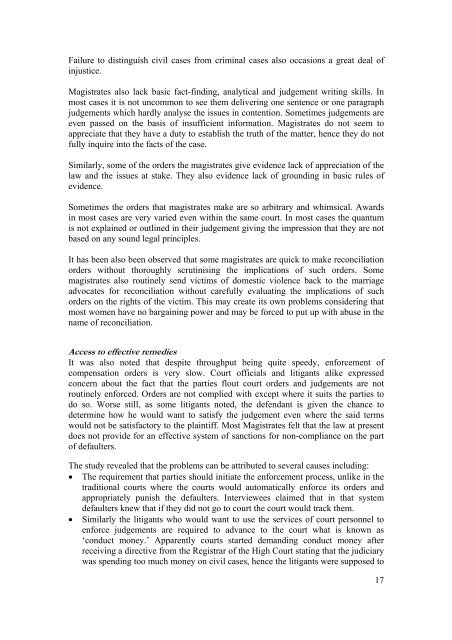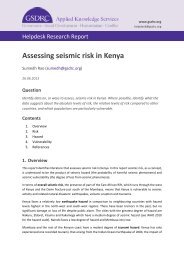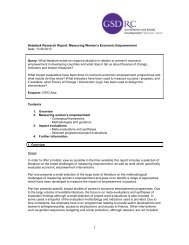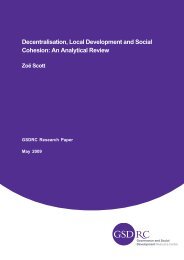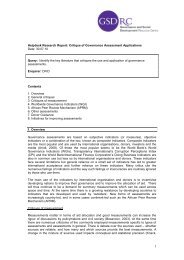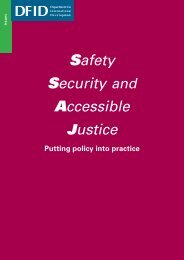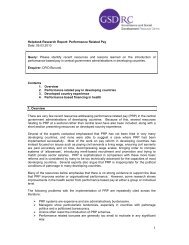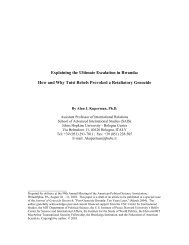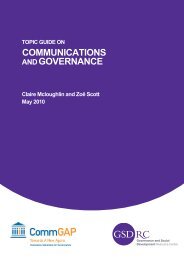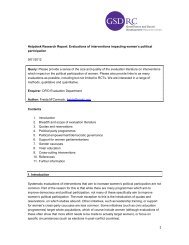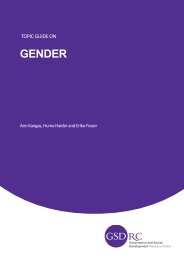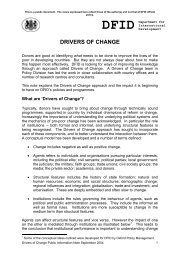ACCESS TO JUSTICE FOR THE POOR OF MALAWI? AN ... - GSDRC
ACCESS TO JUSTICE FOR THE POOR OF MALAWI? AN ... - GSDRC
ACCESS TO JUSTICE FOR THE POOR OF MALAWI? AN ... - GSDRC
- No tags were found...
You also want an ePaper? Increase the reach of your titles
YUMPU automatically turns print PDFs into web optimized ePapers that Google loves.
Failure to distinguish civil cases from criminal cases also occasions a great deal ofinjustice.Magistrates also lack basic fact-finding, analytical and judgement writing skills. Inmost cases it is not uncommon to see them delivering one sentence or one paragraphjudgements which hardly analyse the issues in contention. Sometimes judgements areeven passed on the basis of insufficient information. Magistrates do not seem toappreciate that they have a duty to establish the truth of the matter, hence they do notfully inquire into the facts of the case.Similarly, some of the orders the magistrates give evidence lack of appreciation of thelaw and the issues at stake. They also evidence lack of grounding in basic rules ofevidence.Sometimes the orders that magistrates make are so arbitrary and whimsical. Awardsin most cases are very varied even within the same court. In most cases the quantumis not explained or outlined in their judgement giving the impression that they are notbased on any sound legal principles.It has been also been observed that some magistrates are quick to make reconciliationorders without thoroughly scrutinising the implications of such orders. Somemagistrates also routinely send victims of domestic violence back to the marriageadvocates for reconciliation without carefully evaluating the implications of suchorders on the rights of the victim. This may create its own problems considering thatmost women have no bargaining power and may be forced to put up with abuse in thename of reconciliation.Access to effective remediesIt was also noted that despite throughput being quite speedy, enforcement ofcompensation orders is very slow. Court officials and litigants alike expressedconcern about the fact that the parties flout court orders and judgements are notroutinely enforced. Orders are not complied with except where it suits the parties todo so. Worse still, as some litigants noted, the defendant is given the chance todetermine how he would want to satisfy the judgement even where the said termswould not be satisfactory to the plaintiff. Most Magistrates felt that the law at presentdoes not provide for an effective system of sanctions for non-compliance on the partof defaulters.The study revealed that the problems can be attributed to several causes including:• The requirement that parties should initiate the enforcement process, unlike in thetraditional courts where the courts would automatically enforce its orders andappropriately punish the defaulters. Interviewees claimed that in that systemdefaulters knew that if they did not go to court the court would track them.• Similarly the litigants who would want to use the services of court personnel toenforce judgements are required to advance to the court what is known as‘conduct money.’ Apparently courts started demanding conduct money afterreceiving a directive from the Registrar of the High Court stating that the judiciarywas spending too much money on civil cases, hence the litigants were supposed to17


